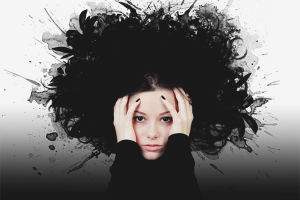The content of the article
Emotionally, in physiological terms, it is the body’s response to external stimuli interpreted in the brain as acceptable or unacceptable to humans. Emotions are present in creatures capable of higher nervous activity (primates, chickens, cats, dogs). They are positive or negative. But in humans, unlike animals, emotions are subjective, i.e. perceived as acceptance or rejection.
How emotions depend on the work of the brain
Emotions are inextricably linked with feelings. And here the role is played by the subjective assessment of the person who happened. The negative emotion of hatred will give one person a feeling of envy, and another a feeling of fear. Because everyone in the subconscious laid their beacons. This is akin to a conditioned reflex or irritant: I see - I feel emotions - I feel.Another person may not feel jealous in the same situation, because he would not like to have the same acquisitions, but he associates the irritant person with a feeling of danger, also unconscious. He understands that the enemy can make a meanness, substitute without a twinge of conscience, and his conscience will not torment him. Subconsciously, the feeling of hatred will turn into fear for your life (not physically, but psychically).
Emotion that has arisen in the head, does not pass by itself. It either goes outside, or gets stuck inside, accumulating and causing psychosomatic illnesses. Depending on the type of temperament and significance of emotions for a given person, different in life expectancy in the body.
- the joy (winning the lottery, enrollment in the university) lasts a day and a half
- satisfaction (received an award, defended a thesis) "live" day
- enthusiasm (I want to help orphans, I will prepare KVN itself) is exhausted in 6 hours
- sympathy for an hour disappears without a trace
- but sadness lives 5 days (remember yourself after parting with your beloved / th)
- you can hate for 2.5 days
- we will be ashamed of the act for about 30 minutes, unless we are talking about pathology
So much time is needed for the brain and the body to process the emotion, to feel and “experience”, releasing into the Universe.
Emotions by themselves do not live. Man feeds his attitude. No wonder about the non-emotional people say that they stand like idols. It is unlikely that they really do not experience anything, and, most likely, have a strong nervous system. After all, emotionality depends on the functioning of the central nervous system and the brain. Positive (delight, admiration) occur in the prefrontal cortex and brain nucleus. The central zone is responsible for the control of bodily sensations (a person endures pain). These factors are due to genetics, but neuronal contours are changing through training and work on themselves.
With depression, the work of neurotransmitters, which transfer nerve impulses between neurons, is impaired. It affects the limbic zone of the brain, the hypothalamus, which produces the "pommes of joy" endorphins, serotonins and dopamines. As a result of a failure (severe life situation, traumatic brain injury) the neurotransmitter ceases to function normally, and the person is not able to experience joyful emotions, even if they are obvious.Depression is a vivid example of how an individual is affected by emotions.
How emotions affect our body
Psychosomatics (from the Greek. "Psycho" - the soul, "Somos" - the body) - is a bodily disease caused due to an overabundance of negative emotions. Take small children. They are taught to suppress emotions, and in fact in early childhood the baby does not hold back emotions. But parents are uncomfortable, and they prepare him for life in a society where it is not customary to show emotions. Does a child show anger when she goes to kindergarten? Mom will immediately stop it. “You will shout loudly and cry, your father will be ashamed of you.” The little man is blamed for the emotions. He accumulates them, and once a therapeutically healthy child begins to constantly get sick, he will have dysbacteriosis, nightmares, etc. While he has not found any deviations from the norm. The reason is the accumulated emotions, because the baby has no rights.
The child is taught to suppress emotions by negative feelings. Mom says to her daughter: “The teacher scolded you for laughing at a lesson. I was ashamed". Perhaps a teacher despot, she likes to manipulate the souls of young creatures? Without understanding the situation, a mother suggests to her son or daughter that he / she is “bad”.The child perceives the words of the mother a priori, without criticism and reasoning. Feel the joy of the neighbor drew a funny face? No you can not? It is necessary to learn to be silent, to suppress emotions in oneself.
A familiar picture, when a mother says to a sobbing baby, “Everything, I will leave you in the store. I have no power! Here, aunt will take you. " For an adult who knows how to analyze what has been said, these words have no meaning, and the child eats into the subconscious. The emotion of fear that it will leave a dear man, mother, is not going anywhere. It is transformed into enuresis, which cannot be treated. Or sleepwalking, nightmares in a dream, etc. Or even worse: fear generates a sense of guilt on a subconscious level.
Noisy baby mom frightened as a child "Grandma has a bad heart, she will feel bad from your screams and running about and she will die." A grandmother once dies of a heart attack, but not because her grandson was expressing emotions too loudly. She had a bad heart. And the child will have a feeling of guilt for life that her grandmother died because of him. In adulthood, repressed emotions can “come around” with depression and neurosis.
How will a man’s body react?which does not provide for the needs of the family, who is cheating on his wife Yes, anything, up to oncology! The body, as it were, responds: “I have not coped with my mission, nobody needs me.”
If each person he meets asks a girl “for 30”, well, when she gives birth to a child, her body will respond with a myoma or a cyst. And hormonal background in order. She needs to either not experience emotions (and in fact they are hitting the patient), or learn how to reflect from herself.
What turns the fear of a schoolboy to be worse than others? Gastritis or gastroduodenitis. What is teen anorexia? This repressed emotions are feelings that you are worse than others, expressed in refusal to eat.
How to learn to control emotions
Why do people experience the same emotions in different ways? One person remains imperturbable even with insults, and the other is upset about every occasion. The third person clings to the negative, relishes, and the fourth immediately forgets all the unpleasant. This is determined by emotional styles that reflect a person’s reaction to life situations. There are six styles:
- Emotional flexibility. It means how quickly a person recovers after experiencing negative emotions. This character trait is defined from birth, but is brought up in early childhood. If parents a hundred times a day remind the kid about pranks, put in a corner, show displeasure with the behavior, the reflex of immersion in the problem will be fixed in it. In adulthood, such people are prone to reflection, self-digging. They have a low resistance to stress, a tendency to depressive moods.
- Emotional context. It determines the ability of a person to recognize which emotions can and cannot be shown in certain situations. What we allow at home is perceived as inadequate at work. Or that with dad and a loved one behave differently.
- World perception. This is how we are able to catch a positive, enjoy life.
- Self-awareness. By it is meant the awareness of the body, its reactions to emotions. What do I feel during anger? Why did my stomach ache? Why did I get acne before the exam? The recognition of body signals on emotions will give the opportunity to control them correctly.
- Emotional intuition. It is the ability to recognize the emotions of other people by their facial expressions, eyes, and secondary non-verbal signs. This quality is more than endowed with women, because they need to learn to read information from the emotions of a baby who is not yet talking.
- Sustainability. Do we easily give in to emotions? If a person has low emotional stability, he “starts” and spends himself. And the opponent feeds on him, because emotions are a flow of energy.
Attitude to emotions is formed in childhood. From how parents react to a particular situation, depends on the further attitude of a person to emotions. The child falls and hits his knee on the asphalt. It hurts him, he cries loudly. Mom says, "Do not worry, we blow on the wound, everything will heal" or "Again you are in a hurry, you walk without looking at your feet." The situation will not change, but the kid will learn to understand that negative emotions are taking place, there is nothing terrible in them, and you should not keep them in yourself. In the book of the American professor of psychology and psychiatry Richard Davidson and writer Sharon Begley “How emotions control the brain” (Peter, 2012), recommendations were given on how to correct emotional style, level out the shortcomings of emotional behavior.
The first step to curb emotions is their awareness.Shakes you when the boss appears? Surely you associate it with a negative. Think about why the boss is aggressive to you? Yes, she envies, though she does not admit it. Envy your attractiveness or youth. And since she guides you, then command tone and humiliation is the way to rise above you. Yes, it is unpleasant, and your anger is justified. But he does not have a way out, so withdraw your emotion from yourself. The boss also has negative emotions for you, but she splashes everything on you.
Emotions act on the body as physical activity. Fear causes an increased heartbeat, joy - a hormonal explosion and euphoria, sadness and grief turn muscles into stone, anger constricts the chest. Sport is the antidote to negative emotion. There is nothing better than walking in the fresh air or jogging in the park, skiing and ice skating, rollerblading and cycling. Exercise increases the brain's production of the “hormones of joy” of endorphin, dopamine and oxytocin. After a rough quarrel go to the pool. An unpleasant conversation with the boss? Dance, buy a one-time fitness pass with a dance program.
Conclusion: controlling emotions is aware of their presence in your life. Emotion is not eternal. Soon another will replace her, and a third one will come after her. Get for yourself an outlet that causes only positive. In case of trouble, go to the pool or gym. Do not stick or drink the negative. Look at what is happening from the side. Does the boss scream at you? Be quiet, it is difficult, but be silent. Imagine that the boss is sitting in a soap bubble and trying to reach you through the walls. You kick a bubble with your foot and it flies across the river to the other side. So with emotion. She lives only because you have not thrown her aside. Learn to throw off the negative and indulge yourself with positive.
Video: how to control your emotions












To send